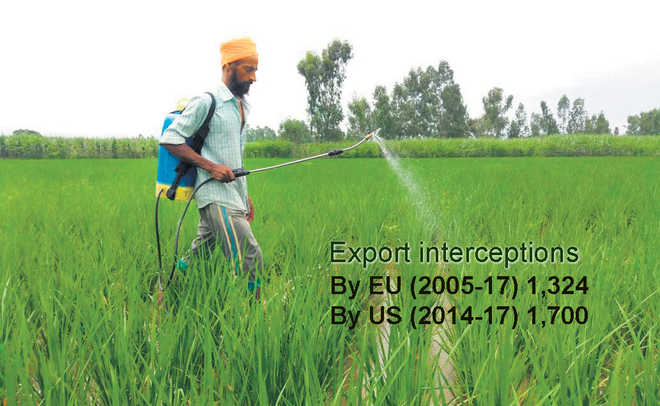
Tribune Photo Malkiat Singh
Punjab's loss is Jammu & Kashmir's gain. Exporters are preferring basmati of J&K because its farmers do not use pesticides and fungicides, and hence their produce commands premium, says Bhuwan Bhaskar
The soothing aroma of basmati has turned foul for thousands of farmers in Punjab. Recently, beginning of this week, the worst feared news for the exporters and farmers of the commodity came from Saudi Arabia that some containers of basmati rice having been exported primarily from Punjab, were rejected due to the presence of tricyclazole above the permissible limit.
In fact, it was just a predictable outcome after the Saudi Food and Drug Administration (SFDA) emulated the fungicide levels as per European Union standards, with traces of tricyclazole permitted not more than 0.01 mg in a kilogram of rice. Since January, Norway, Sweden, England and Finland have already rejected at least 30 containers of basmati.
Even though Indian agri exporters have a long list of stories of rejections due to the excessive use of pesticides and fungicides by farmers, it is unfortunate that the action to rectify the problem has largely been limited to efforts by exporters' associations and some farmers’ groups. In 2011-12, around 30 per cent of the total basmati exports to the US was rejected due to high pesticide content. And basmati is only one commodity. Products such as mangoes, table grapes, okra, peanuts, curry leaves, chillies, shrimps, prawns, and tamarind have faced rejections and even bans in markets such as the US, Vietnam, the EU, Saudi Arabia, Japan and Bhutan due to issues of the presence of higher-than-approved levels of chemical residues, and pest and bacterial infestation.
A recent study by the ICRIER has given startling facts in this context. "Indian agriculture produce faces more rejections in key export markets compared to products from other developing countries", says the report. According to the data published by the European Union Notification System for Plant Health Interceptions (EUROPHYT) portal, "Between 2005 and 31st May 2017, Indian exports faced 1,324 interceptions as compared to 452 for Brazil, 602 for China, 114 for Turkey and 922 for Vietnam." A majority of the interceptions for India were raised in 2012 and 2013, and these pertained to eggplant, mangoes, snake gourd, bitter gourd and arabi, among others. This led to a ban in the entry of mangoes and these vegetables.
In most cases, the ban gets lifted after sometime. But the damage, usually, is much deeper as many a time, exporters from some other competitive country capture the market by that time. Like in the case mentioned above, Indian exporters lost their market share in products such as eggplant to exporters from countries such as Kenya.
Even in the US, the FDA refused around 1,700 products between 2014 and May 2017. Primarily, these incidents hurt the exporters only. But ultimately, it is the farmer who pays the price. Because, once exporters from some other country capture a market, it becomes very difficult for Indian exporters to win it back.
The latest case of rejection of basmati rice has shown the same trend, albeit in another way. As rice farmers in Jammu and Kashmir don't use the fungicide tricyclazole, traders have started purchasing basmati from them giving hefty premium. And here is the lesson for Indian agriculture and policymakers. India is among the top 10 WTO member countries in the export of agriculture commodities. But, even after numerous incidents of refusal of Indian food products, there is hardly any institutional mechanism in place which regulates the usage of chemicals in cultivation. There are many chemicals which are banned even in countries like Africa, but are being used indiscriminately in Indian fields.
According to CSE, seven hazardous chemicals make around 30 per cent of the total usage of chemical in agriculture in India. These seven chemicals are banned in most of the countries in the world and are part of the list of 18 Class-I (classified as extremely/highly hazardous) chemicals. So, as long as the Central and state governments don't takeup this cause as a movement, there is little hope of change. The Modi government has, in fact, focussed on organic farming in a big way and has included it in one its core agriculture policies. But organic farming is more like a purist form of agriculture which should not be expected to provide thousands of tonnes of agri commodities for export purposes. Not in the near future, at least. Instead, the government should focus on MRL (maximum residual limit). With increasing levels of cancer due to food contamination in our own country, it is high time the government unleashes a war on unabated chemical usage in agriculture. It needs a massive awareness programme among farmers about the actual quantity of chemicals needed to be used in order to get optimum productivity along with MRL. Only then can Indian farmers tap the foreign markets in a big way, keeping pace with the ever-rising demand from quality-conscious food markets of the developed world.
— The writer is AVP in NCDEX. His views are personal



























